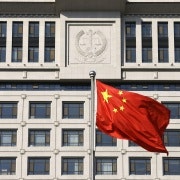Occupy puts the ball in Beijing's court
After a sleepless night the mood in Hong Kong is of uncertain waiting. On Sunday morning, after more than 48 hours of students blockading Government House in protest of the detention of 61 student activists including 17 year old Joshua Wong, the long awaited Occupy Central with Love and Peace began. Tens of thousands of protesters converged on Government House with two demands: “the withdrawal of the decision on Hong Kong’s constitutional development made on August 31 by the Standing Committee of the National People’s Congress (NPCSC) and the restart of the constitutional development consultation by the Chief Executive”.
The protesters are clearly students of Mahatma Gandhi: they came prepared to face tear gas with surgical masks, cling-wrap and plastic rain coats to cover their mouth, nose, eyes and skin. They distributed huge provisions of water, sterile saline solution and other medical supplies. People mulled around, standing and watching police, taking photos and sharing their message online, despite the struggling mobile network. Leaders spoke through megaphones, asking police to go on strike and reiterating their demands while demonstrators cheered and clapped.
When police advanced, armored and armed with batons, shields and tear gas, demonstrators surrounded them, displaying their empty hands, chanting for the police to “protect citizens” and “go on strike”. At one point, about an hour after tear gas had been used, the whole crowd joined in singing a local song to the police. An hour later police again displayed large banners demanding people disperse and warning that tear gas was about to be deployed. After about a minute of warning, four canisters were launched into the crowd, creating thick clouds of smoke but having not much impact on the determined and prepared group.
This morning, the scene is mostly empty: no broken glass, no beer cans, just empty bottles of water and torn down police tape piled around rubbish bins and collection points. Young people are resting near their barricades, ready to call support if the police move to intervene, but allowing their main numbers to congregate at the strategically more important space in front of Government House.
Police are also resting after what can only have been a terrifying night despite protesters commitment to peaceful means. The MTR is full of people going to work, but offices and shops in Central and Admiralty are closed.
The Chinese language local news paper front page displays tear gas deployed upon thousands of protesters. But in China, websites have been ordered to immediately remove any information about the conflict in Hong Kong between students and the government or about Occupy Central and to ‘report issues’ and delete harmful information. Instagram was shut down over night and other social media are filtered or blocked.
Not everyone in Hong Kong supports Occupy Central – there has been an ongoing argument around the city between people who think civil disobedience is the only way to resolve their disagreement with Beijing and those who call themselves the ‘silent majority’, who want to have better relations with Beijing and prefer a more conciliatory approach they see as being less risky.
For now, no one knows how the mood of the city will turn. The images of police aggression against peaceful demonstrators has captured the attention and emotions of many people who were previously ambivalent. Wednesday is the 65th anniversary of the founding of the People’s Republic of China – China’s national day and a two day public holiday in Hong Kong. This evening, when people leave their offices, we will see how they react. There is no doubt those who continue to demonstrate will be even more prepared than yesterday, with distribution of goggles and other supplies going on today. But how many people join them will be a key test for the city.
By 8pm the ball will be in the government’s court as they play for the future of Hong Kong. But from Beijing, the stakes are even higher than that: Taiwan, Tibet, Xinjiang and the Communist Party’s survival may all be at stake in Hong Kong this week. Both sides know what they’re up against. Whether or not a peaceful way forward can be found, history is being written.
















